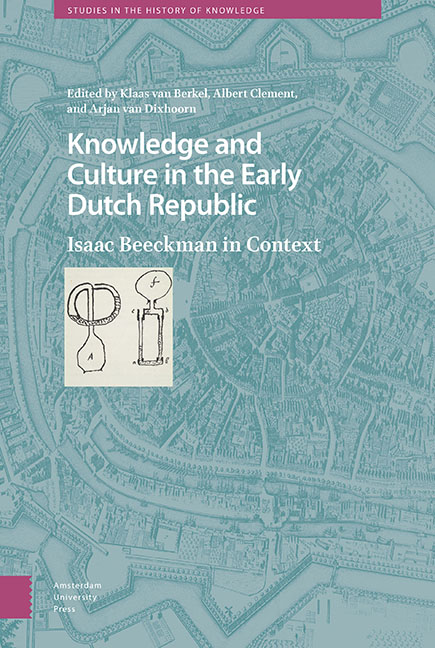4 - Framing Beeckman: Cornelis de Waard as Editor of the Beeckman Papers
Published online by Cambridge University Press: 07 October 2022
Summary
Abstract
By editing Isaac Beeckman's lost notebook as the Journal, Cornelis de Waard presented an interpretation of Beeckman that very much dominated further discussions of his contribution to the Scientific Revolution. De Waard modelled his edition of the notebook like Paul Tannery and he himself had done with their edition of the correspondence of Marin Mersenne. De Waard took the notebook to be a scientific diary, which documented the chronological development of his thought, and he acted as if the notebook was a collection of notes that should have resulted in a treatise on the mechanical philosophy (but did not). The result was the picture of Beeckman as a failed scientist, whereas Renéwed attention to the actual notebook may reveal other interests of Beeckman, his actual place in the networks of knowledge in the first half of the seventeenth century, and his self-image as a philosopher.
Keywords: Isaac Beeckman, Cornelis de Waard, Marin Mersenne, scientific diary, editorial decisions
No historian of science has contributed more to the study of Isaac Beeckman than Cornelis de Waard, the somewhat reclusive teacher of mathematics and physics from the city of Vlissingen in the Dutch province of Zeeland. Before 1905, the year in which De Waard rediscovered Beeckman's long-lost scientific notebook, the latter, a schoolmaster from Dordrecht, was just a shadowy figure in the margins of the study of Descartes, both in France and elsewhere. Through Adrien Baillet's biography of Descartes (1691), scholars knew that Beeckman was in some way involved in the maturing of Descartes’ ideas, but little else was known. After 1905, however, Beeckman gradually became better known to historians of science and philosophy. Certainly after De Waard's masterful edition of the Journal tenu par Isaac Beeckman de 1604 à 1634 in 1939-1953, it was possible to reconstruct Beeckman's own ideas about nature and its mechanisms, to study his dealings with Descartes and others, and to assess how he fits into what came to be called the Scientific Revolution of the seventeenth century.
De Waard's edition of the Journal was a major contribution to the history of science, but, as we know, every edited publication is in some ways a distortion, and the Journal tenu par Isaac Beeckman de 1604 à 1634 is no exception. Every editor has to make choices about what to include and what not, how to arrange the material, and how to proceed with the annotation.
- Type
- Chapter
- Information
- Knowledge and Culture in the Early Dutch RepublicIsaac Beeckman in Context, pp. 63 - 80Publisher: Amsterdam University PressPrint publication year: 2022



